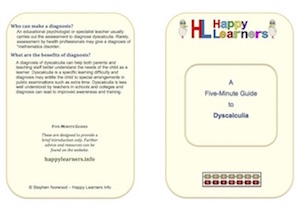What is dyscalculia?
Dyscalculia is a type of learning difficulty where individuals struggle with basic mathematical concepts and performing arithmetical calculations. The condition can be diagnosed when there are no other global issues affecting learning. It is therefore what is known as a specific learning difficulty. Dyscalculia can also be known as Mathematics Disorder.
About 3-6% of the population are affected by dyscalculia. It affects both boys and girls equally.
How do you support children with dyscalculia?
Individuals with dyscalculia struggle with mastering arithmetical concepts but can often be unaffected in their understanding of more complex mathematical ideas. It is important in older children to avoid difficulties with basic concepts becoming a barrier to accessing the wider maths curriculum. Children can be supported by:
Overlearning of basic maths skills
Multi-sensory approaches that enable the child to experience the same mathematical concept in different ways
Access to visual aids such as number squares and multiplication tables
Access to completed examples of calculations and formulae
Task boards that break down each step involved in the problem or calculation
Access to calculators to perform the arithmetical part of maths problems
Encouragement to use informal jottings to help them
Diagnosis
An educational psychologist or specialist teacher usually carries out the assessment to diagnose dyscalculia. Rarely, assessment by health professionals may give a diagnosis of mathematics disorder.
A diagnosis of dyscalculia can help both parents and teaching staff better understand the needs of the child as a learner. Dyscalculia is a specific learning difficulty and diagnosis may entitle the child to special arrangements in public examinations such as extra time. Dyscalculia is less well understood by teachers in schools and colleges and diagnosis can lead to improved awareness and training.



